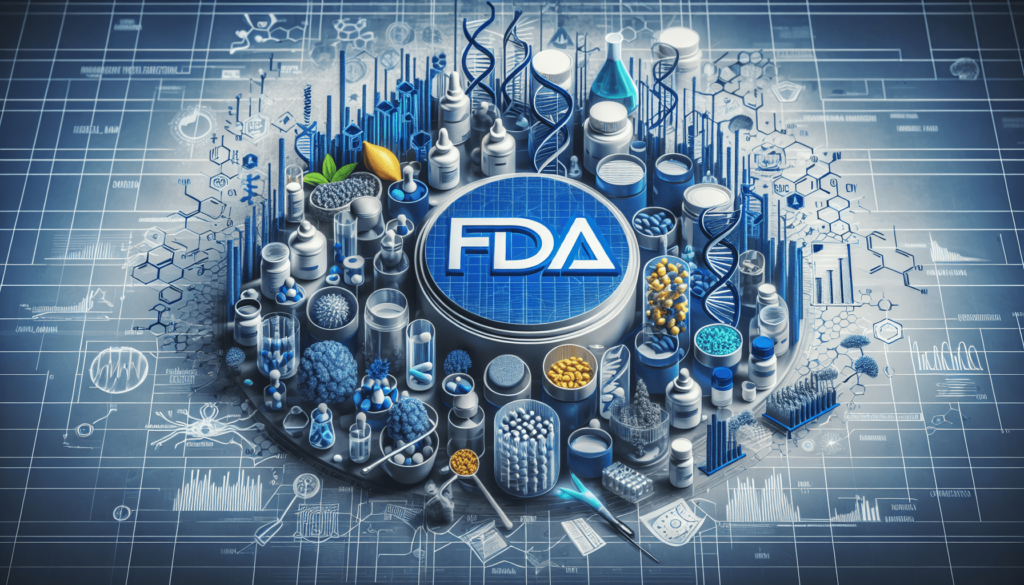Are you curious to know how the FDA ensures the safety and efficacy of nutraceuticals and functional foods? In this article, we will explore the regulatory framework implemented by the FDA to monitor and control the production and distribution of these products. Discover the processes and guidelines established by the FDA, which play a crucial role in protecting consumer health and promoting transparency in the nutraceutical and functional food industry.
Definition of Nutraceuticals
What are nutraceuticals?
Nutraceuticals, also known as functional foods or dietary supplements, are products that are derived from food sources and are believed to provide health benefits beyond basic nutrition. These products contain bioactive compounds, such as vitamins, minerals, antioxidants, and phytochemicals, that have potential therapeutic effects on the body.
Differentiating nutraceuticals from drugs and dietary supplements
Nutraceuticals can sometimes be confused with drugs or dietary supplements, but there are key differences between these categories. Drugs are specifically intended to treat, prevent, or diagnose diseases and must undergo rigorous testing and clinical trials for safety and efficacy. Dietary supplements, on the other hand, are products that are taken orally and are intended to supplement the diet, but are not considered a substitute for food. Nutraceuticals fall somewhere in between, as they are derived from food sources but also have potential health benefits.
Examples of nutraceutical products
There are numerous nutraceutical products available on the market today. Some common examples include omega-3 fatty acid supplements, probiotics, herbal supplements, fortified foods and beverages, and functional beverages that claim to provide energy or support immune health. These products often come in various forms, such as capsules, tablets, powders, or liquids, and can be found in health food stores, pharmacies, or online retailers.
Definition of Functional Foods
What are functional foods?
Functional foods are foods that have been fortified or enriched with additional nutrients or bioactive compounds that provide health benefits beyond basic nutrition. These foods are designed to promote optimal health and wellness, and may have specific physiological functions or reduce the risk of certain diseases. Functional foods can be consumed as part of a regular diet and are widely available in grocery stores or specialty health food stores.
Differentiating functional foods from regular foods
Regular foods provide essential nutrients and energy to sustain life, while functional foods offer additional health benefits due to the presence of added bioactive compounds. Functional foods contain ingredients that have been scientifically proven to have specific health benefits, such as lowering cholesterol, improving heart health, boosting immunity, or supporting cognitive function. Regular foods, on the other hand, do not have the same targeted health benefits and generally do not contain added functional ingredients.
Examples of functional food products
Functional foods can take many different forms and can be found in a variety of food categories. Some examples of functional foods include probiotic yogurts, fortified cereals and breads, heart-healthy margarine, omega-3 enriched eggs, and beverages fortified with vitamins or antioxidants. These products are specifically formulated to provide increased nutritional value and can often be identified by specific health claims on their packaging.

The FDA’s Regulatory Authority
Overview of FDA’s role in regulating nutraceuticals and functional foods
The Food and Drug Administration (FDA) is the regulatory authority responsible for overseeing the safety, labeling, and quality of nutraceuticals and functional foods in the United States. The FDA’s primary role is to ensure that these products are safe to consume and that they are accurately labeled to prevent misleading or false claims.
Laws and regulations governing nutraceuticals and functional foods
Nutraceuticals and functional foods are subject to a range of laws and regulations enforced by the FDA. These laws include the Federal Food, Drug, and Cosmetic Act (FDCA), which defines the standards for food safety, labeling, and ingredients, and the Dietary Supplement Health and Education Act (DSHEA), which specifically regulates dietary supplements. Additionally, the FDA issues guidance documents and regulations to provide manufacturers with clear requirements for producing and marketing these products.
FDA’s approach towards safety and labeling of these products
The FDA’s approach towards safety and labeling of nutraceuticals and functional foods is focused on protecting public health while allowing for innovation and consumer choice. The agency requires that these products be manufactured in accordance with current Good Manufacturing Practices (cGMPs) to ensure quality and safety. Additionally, the FDA reviews health claims made by manufacturers to ensure they are supported by scientific evidence and does not allow false or misleading claims that could potentially harm consumers.
Reviewing Ingredients and Claims
Evaluation of ingredients in nutraceuticals and functional foods
The FDA closely evaluates the ingredients used in nutraceuticals and functional foods to ensure that they are safe for consumption. Each ingredient must have a history of safe use or be generally recognized as safe (GRAS) based on scientific evidence. The FDA also conducts pre-market assessments of new dietary ingredients to determine their safety and whether they meet the criteria for being classified as a dietary supplement.
Process of reviewing health claims
Manufacturers of nutraceuticals and functional foods are required to submit a notification to the FDA for any health claims they wish to make on their product labels. The FDA reviews these claims to ensure they are supported by credible scientific evidence and can be substantiated. Health claims must be truthful and not misleading, and they must accurately convey the specific health benefits associated with the product.
Enforcement actions against misleading claims
The FDA takes enforcement actions against manufacturers who make false or misleading claims about the health benefits of their nutraceutical or functional food products. These actions can range from issuing warning letters and product recalls to imposing fines or seizing products. The FDA’s goal is to protect consumers from misleading information and ensure that products on the market are safe and effective.

Current Good Manufacturing Practices
Requirements for manufacturing facilities
Current Good Manufacturing Practices (cGMPs) are a set of regulations and guidelines that outline the requirements for manufacturing, testing, and packaging nutraceuticals and functional foods. These regulations ensure that manufacturing facilities have appropriate quality control systems in place to prevent contamination, ensure accurate labeling, and maintain the integrity of the products.
Quality control measures
Manufacturers of nutraceuticals and functional foods must implement quality control measures to ensure that their products meet the required standards. This includes conducting regular testing of raw materials and finished products to verify their identity, purity, strength, and composition. Quality control also involves maintaining detailed records of all manufacturing processes and conducting regular audits to ensure compliance with cGMPs.
Adherence to proper labeling and packaging standards
Proper labeling and packaging are essential for nutraceuticals and functional foods to provide consumers with accurate information about the product. Manufacturers must comply with FDA regulations regarding the placement and size of labels, as well as the inclusion of mandatory information such as the product’s name, ingredients, nutritional facts, and any required warnings or allergen disclosures. Packaging must also be designed to protect the product’s integrity and prevent contamination.
Labeling Requirements
Mandatory labeling information for nutraceuticals and functional foods
The FDA requires that nutraceuticals and functional foods contain certain mandatory labeling information to ensure transparency and consumer understanding. This includes the product’s name, net quantity of contents, ingredients list, nutritional facts, the name and address of the manufacturer or distributor, and any required warning statements or allergen disclosures. The labels must be clear, legible, and conspicuous, allowing consumers to easily identify the product and make informed decisions.
Specific labeling requirements for certain ingredients
Certain ingredients in nutraceuticals and functional foods require additional labeling to inform consumers of potential risks or allergens. For example, if a product contains a known allergen such as peanuts, the label must clearly state this information to prevent allergic reactions in sensitive individuals. Additionally, ingredients that are new to the market or contain novel substances may require special labeling or additional safety warnings to alert consumers to any potential risks.
Disclosures regarding potential allergens and risks
To protect public health, nutraceuticals and functional foods must clearly disclose any potential allergens or risks associated with the product. This includes identifying common allergens, such as peanuts, tree nuts, milk, eggs, fish, crustacean shellfish, soy, and wheat, on the label. Manufacturers must also disclose any known risks or side effects associated with the product’s ingredients, especially if they are derived from botanical sources or have known interactions with certain medications.
Safety and Adverse Event Reporting
Ensuring safety through pre-market approval and post-market surveillance
To ensure the safety of nutraceuticals and functional foods, the FDA employs a combination of pre-market approval and post-market surveillance. Pre-market approval involves reviewing the safety and efficacy data provided by manufacturers before a new product is allowed to enter the market. Post-market surveillance involves monitoring the safety of products that are already on the market, through activities such as adverse event reporting, product testing, and inspections.
Reporting adverse events and product issues
Consumers, healthcare professionals, and manufacturers are encouraged to report any adverse events or product issues associated with nutraceuticals and functional foods to the FDA. Adverse events can include allergic reactions, illness, or other negative health effects. By reporting these incidents, the FDA can identify potential safety concerns, take appropriate action to protect public health, and conduct investigations to determine the cause of the issue.
FDA’s role in addressing safety concerns
When significant safety concerns arise regarding a nutraceutical or functional food product, the FDA has the authority to take actions to mitigate the risks. These actions can include issuing warnings to consumers, requesting voluntary recalls from manufacturers, or, in severe cases, ordering mandatory recalls. The FDA also has the power to take legal action against manufacturers who fail to address safety concerns promptly or take appropriate corrective actions.
Importing and Exporting Nutraceuticals and Functional Foods
Importation regulations and requirements
Importing nutraceuticals and functional foods into the United States is subject to strict regulations and requirements enforced by the FDA. Importers must comply with the FDCA and other applicable laws, maintain proper documentation, and ensure that the products meet U.S. standards for safety and labeling. The FDA conducts inspections of imported products and has the authority to refuse entry or detain products that do not meet the required standards.
Exportation considerations for manufacturers
For manufacturers looking to export nutraceuticals and functional foods, it is essential to understand the regulations and requirements of the target country. Different countries may have varying standards for safety, labeling, and ingredient approval. Manufacturers should ensure that their products comply with the regulations of the destination country, obtain any necessary export certifications, and work closely with international regulatory agencies to facilitate the exportation process.
Collaboration with international regulatory agencies
The FDA collaborates with international regulatory agencies to promote global harmonization of regulations and strengthen the safety of nutraceuticals and functional foods worldwide. Through initiatives such as information sharing, scientific collaboration, and regulatory cooperation, the FDA works to align standards, share best practices, and ensure that consumers have access to safe and properly labeled products in the global market.
Enforcement Actions and Compliance
Types of enforcement actions taken by the FDA
The FDA takes various enforcement actions to ensure compliance with regulations governing nutraceuticals and functional foods. These actions can range from issuing warning letters to manufacturers who violate labeling or safety requirements, to conducting product seizures or injunctions against products that pose a significant risk to public health. The FDA may also pursue criminal prosecutions against individuals or companies that deliberately violate the law or engage in fraudulent practices.
Penalties for non-compliance
Non-compliance with FDA regulations can result in significant penalties for manufacturers of nutraceuticals and functional foods. Penalties may include fines, product recalls, mandatory corrective actions, or even legal action seeking injunctions or criminal charges. The severity of the penalty depends on the nature and extent of the violation, potential harm to consumers, and whether the violation was intentional or unintentional.
Working with industry to ensure compliance
While the FDA’s role includes enforcing regulations, the agency also actively works with industry stakeholders to promote compliance and prevent violations. The FDA provides guidance documents and resources to help manufacturers understand and meet regulatory requirements. The agency also encourages industry collaboration through partnerships, educational programs, and voluntary initiatives to facilitate the production of safe and effectively labeled nutraceuticals and functional foods.
Future Developments and Challenges
Emerging trends in nutraceuticals and functional foods
The nutraceuticals and functional foods industry is continually evolving, with new products and ingredients emerging to meet consumer demands for health and wellness. Some emerging trends in this industry include the use of novel ingredients, such as plant-based proteins, adaptogens, and CBD-infused products. The development of personalized nutrition, where products are tailored to individuals based on genetic or biomarker data, is also gaining traction. Additionally, functional foods that support specific health conditions, such as gut health or mental well-being, are becoming more prevalent.
Challenges in regulating innovative products
Regulating innovative nutraceuticals and functional foods poses challenges for the FDA. The rapid pace of product development and the emergence of new ingredients can outpace regulatory frameworks, making it difficult to keep up with advances in the industry. Additionally, determining the safety and efficacy of innovative products often requires rigorous scientific research and evidence, which can be time-consuming and resource-intensive. Balancing consumer access to innovative products with the need for thorough regulation and oversight remains a challenge for the FDA.
FDA’s efforts to adapt to changing market landscape
The FDA recognizes the need to adapt to the changing market landscape of nutraceuticals and functional foods. The agency is committed to fostering innovation while ensuring the safety and efficacy of these products. The FDA continues to explore new approaches, such as expedited review processes for novel ingredients, engaging in collaborative research partnerships, and leveraging advanced technologies to improve the regulatory processes. Through these efforts, the FDA aims to keep pace with industry advancements and provide consumers with safe and effective nutraceuticals and functional foods.
In conclusion, the FDA plays a crucial role in regulating nutraceuticals and functional foods in the United States. The agency focuses on ensuring safety, accurate labeling, and adherence to quality standards. Through rigorous evaluation of ingredients, review of health claims, enforcement actions against misleading claims, and collaborations with international regulatory agencies, the FDA strives to protect public health and promote consumer confidence in these products. Despite the challenges posed by emerging trends and innovative products, the FDA remains committed to adapting to the evolving market landscape and fostering a healthy and informed marketplace for nutraceuticals and functional foods.
